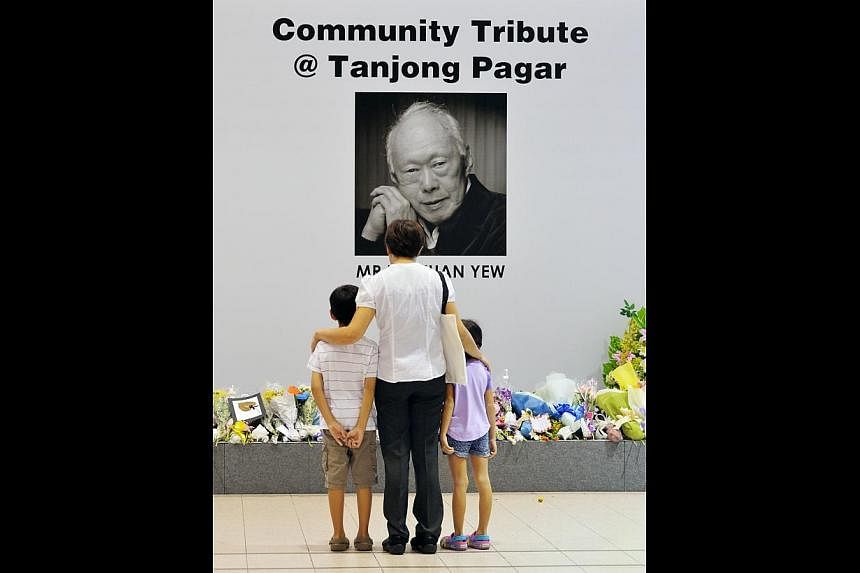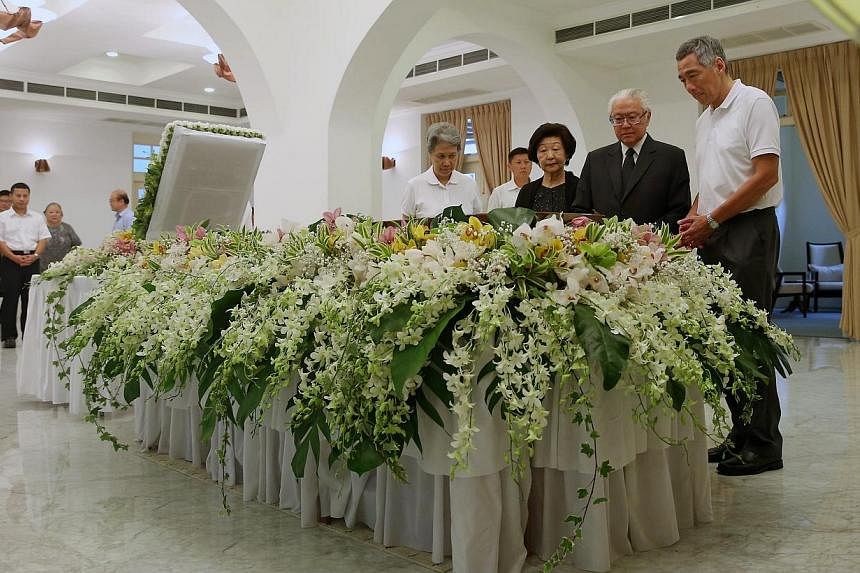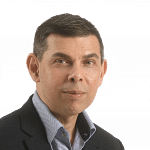Singapore entered the post-Lee Kuan Yew era yesterday, with the passing of founding father Lee Kuan Yew, 91.
It was a day that had been widely anticipated, not least since Mr Lee himself had often spoken of the need for leadership succession and had pushed it relentlessly, giving up his own job as Prime Minister in 1990 after 31 years and while still robust at 67.
Yet, when the time finally came - he died at 3.18am yesterday at the Singapore General Hospital where he had been hospitalised since Feb 5 with severe pneumonia - there was a palpable sense of loss in the country, from the halls of the Istana to the streets of Tanjong Pagar.
As soon as the Prime Minister's Office announced the news an hour later, an unprecedented outpouring of tributes and messages of condolence began appearing online, and continued all day.
An emotional Prime Minister Lee Hsien Loong fought back tears when he appeared live on television from the Istana at 8am to deliver the news that the first Prime Minister, his father, had died. He said he was "grieved beyond words".
"The first of our founding fathers is no more. He inspired us, gave us courage, kept us together, and brought us here. He fought for our independence, built a nation where there was none, and made us proud to be Singaporeans. We won't see another man like him," he said.
To many here and abroad, he said, "Lee Kuan Yew was Singapore. Singapore was his abiding passion. He gave of himself, in full measure, to Singapore. As he himself put it towards the end of his life and I quote, 'I have spent my life, so much of it, building up this country. There's nothing more that I need to do. At the end of the day, what have I got? A successful Singapore. What have I given up? My life.'"
PM Lee called on Singaporeans to honour Mr Lee's spirit, even as they mourned his loss, and work together to "build on his foundations, strive for his ideals, and keep Singapore exceptional and successful for many years to come".
On hearing news of Mr Lee's passing, people immediately began making their way to the Istana, Tanjong Pagar and Parliament House, their numbers growing through the day. Many, both men and women, were wet-eyed.
At the Istana's Orchard Road gates, the crowd waited patiently to pen heartfelt condolence messages and catch a glimpse of Mr Lee returning to the grounds for the last time. When the silver hearse bearing his casket arrived at about 1pm, applause and cheers broke out, as well as cries of "Thank you, Mr Lee!"
Over at Tanjong Pagar, which Mr Lee represented for 60 years since 1955, thousands more turned out to pay tribute to the man some called the "father of the nation", bowing respectfully before a large portrait of him.
Retired calligrapher Seow Cheong Choon, 80, wept as he recounted how he had once railed against Mr Lee, doubting he would deliver on his promises to house Singapore's slum dwellers and squatters.
"He said he would give us all a house. Not just one or two people, but the thousands living in attap houses," he said in Mandarin. "I was angry with his promises of false hope. Who could believe him? Singapore was chaotic, muddy, full of gangsters."
He was referring to the time Mr Lee had declared at a 1965 grassroots event: "This country belongs to all of us. We made this country from nothing, from mudflats... Today, this is a modern city. Ten years from now, this will be a metropolis. Never fear!"
That vision was to become a reality, and one of those who lived through the city's transformation was Mr Seow, who moved into a new three-room flat in Kim Tian Road in the late 1960s.
Mr Lee led a pioneer generation of Singaporeans to overcome similarly daunting challenges, including rebuilding the economy after the sudden pullout of British forces and the oil shocks of the 1970s, and a major economic recession in the mid-1980s.
Little wonder then that he came to be regarded as the man most instrumental in shaping this country, from the time he and his People's Action Party colleagues pushed for self-government in the 1950s to their quest for merger with the Federation of Malaya, Sabah and Sarawak to form the new nation Malaysia in the early 1960s, and their efforts to secure the Republic's survival after independence was thrust on it on Aug 9, 1965.
He famously wept on TV announcing the "moment of anguish", when Singapore was "severed" from Malaysia. Not only had he believed deeply in a unified Malaysia as a multiracial society, but he must also have sensed the enormity of the task for the new city-state to make a living in an inhospitable world.
His decades in office were not uncontroversial. Having survived life-and-death battles with the communists and communalists in Singapore's troubled early years, he made plain that he was not averse to donning "knuckledusters" to take on and "demolish" his political adversaries. He refused to be swayed by popular sentiment or opinion polls, believing that voters would come round when they eventually saw the benefits of policies he had pushed through.
He was both a visionary and a radical thinker, and was instrumental in a host of major policies that have shaped almost every aspect of Singaporeans' lives, from promoting public housing, home ownership, racial integration in public estates and, later, estate upgrading, to adopting English as a common language for the disparate races in Singapore.
He made multiracialism and meritocracy as well as economically sound and corruption-free government hallmarks of the Singapore way. He carried over his own frugal ways to the business of government and was relentless in his fight against the "cancer of corruption", making plain no one was beyond being investigated and ejected from office if they strayed.
He pushed for ministers and senior civil servants to be paid salaries pegged to private sector rates, despite that being controversial, believing it was necessary if Singapore was to continue to enjoy good, clean government.
And if this city gained a reputation worldwide for also being one of the cleanest and greenest, it was because the Prime Minister himself took a personal interest in enhancing the island's greenery, parks and waterways, long before such environmental consciousness became fashionable.
World leaders acknowledged this track record and were lavish with their accolades yesterday. Malaysian Prime Minister Najib Razak noted that Mr Lee's "achievements were great, and his legacy is assured", while Indian Prime Minister Narendra Modi hailed him as a "far-sighted statesman and a lion among leaders".
United States President Barack Obama said in a statement: "He was a true giant of history who will be remembered for generations to come as the father of modern Singapore and as one of the great strategists of Asian affairs."
At home, even opposition politicians who bore the brunt of Mr Lee's no-holds-barred broadsides put aside their partisan differences, with leaders such as those from the Workers' Party and Singapore Democratic Party extending their condolences to PM Lee and his family.
Yesterday was the first of a two-day private family wake at Sri Temasek in the Istana, when family members, past and present Cabinet ministers and MPs, as well as old friends of Mr Lee and his family paid their last respects. Among them were Brunei Sultan Hassanal Bolkiah, former Chief Justice Yong Pung How and Hong Kong tycoon Li Ka Shing.
Tomorrow, his body will be taken to Parliament House to lie in state until Saturday and members of the public will be able to pay their last respects. A State Funeral will be held on Sunday at 2pm at the University Cultural Centre in Kent Ridge, followed by a private cremation at Mandai Crematorium.
Mr Lee leaves his two sons, PM Lee, 63, and Mr Lee Hsien Yang, 57, daughter Lee Wei Ling, 60, daughters-in-law Ho Ching, 61, and Lee Suet-Fern, 56, seven grandchildren and two siblings. His wife, Madam Kwa Geok Choo, died in 2010 at the age of 89.
He had soldiered on with his public duties after retirement, and even after the loss of his wife of 63 years, whom he mourned deeply, but mostly in private. They had married secretly as undergraduates in Cambridge in 1947, and Mr Lee is said to have instructed, in a note to his children, that when the time came, their ashes should be mixed so they might be "joined after life as they had been in life".
Summing up his life's work in his two-part memoirs, The Singapore Story, Mr Lee once revealed how he and his colleagues believed that Malaysian leaders anticipated the day when an independent Singapore would fail and be forced to appeal for readmission to the Federation, on Malaysia's terms.
"No, not if I could help it," he once declared. "People in Singapore were in no mood to crawl back after what they had been through. The people shared our feelings and were prepared to do whatever was needed to make an independent Singapore work. I did not know I was to spend the rest of my life getting Singapore not just to work, but to prosper and flourish."

1923: Born on Sept 16 to Shell Oil Company depot manager Lee Chin Koon and Chua Jim Neo in his family's two-storey bungalow at 92 Kampong Java Road.
1935: Came in first in Telok Kurau English School in an islandwide exam and won a place in Raffles Institution, where he met future wife Kwa Geok Choo in 1939. He previously attended two Chinese-medium schools.
1940: Topped the Senior Cambridge exams in Singapore and Malaya and won the Anderson Scholarship to read English, economics and mathematics at Raffles College.

1946: Began law school at the London School of Economics but moved to Cambridge University the next year, when Kwa joined him. They married secretly on Dec 23, 1947 in Stratford-upon-Avon.
1950: Called to the Bar at the Middle Temple after graduating the year before. Returned to Singapore, joined law firm Laycock & Ong and married Mrs Lee officially on Sept 30. They had three children: Hsien Loong (born in 1952); Wei Ling (1955); and Hsien Yang (1957).

1954: Formed the People's Action Party, inaugurated at Victoria Memorial Hall on Nov 21.

1955: Elected legislative assemblyman for Tanjong Pagar on April 2. Founded his own law firm Lee & Lee with Mrs Lee and younger brother Dennis on Sept 1.
1959: Sworn in as Singapore's first Prime Minister at the age of 35 after PAP won 43 out of 51 seats in the general election.
1960: Enacted a law to wipe out corruption and establish a clean and effective government.
1961: Set up the Economic Development Board to draw foreign investments to an industrialising Singapore.
1963: Malaysia formed, comprising Malaya, Singapore, Sabah and Sarawak.
1963: Launched a home ownership scheme which enabled 91 per cent of Housing Board residents to own their homes by 1996.
1965: Singapore separated from Malaysia on Aug 9. Mr Lee wept on national TV, saying he had believed his whole life in the unity of the two territories.

1967: Full-time National Service introduced to build Singapore's defence force ahead of British troops' pullout in 1971.
1990: Stepped down as PM after 31 years and succeeded by Mr Goh Chok Tong. Appointed Senior Minister on Nov 28.
1998: Published first volume of memoirs The Singapore Story. Second volume, From Third World To First: The Singapore Story, was launched in 2000.
2004: Assumed the post of Minister Mentor after his son Hsien Loong became PM, and Mr Goh was made SM on Aug 18.
2010: Mrs Lee died on Oct 2 after a long illness caused by strokes.
2011: Mr Lee stepped down from the Cabinet.
2015: Died yesterday at 3.18am, leaving his three children and seven grandchildren.




